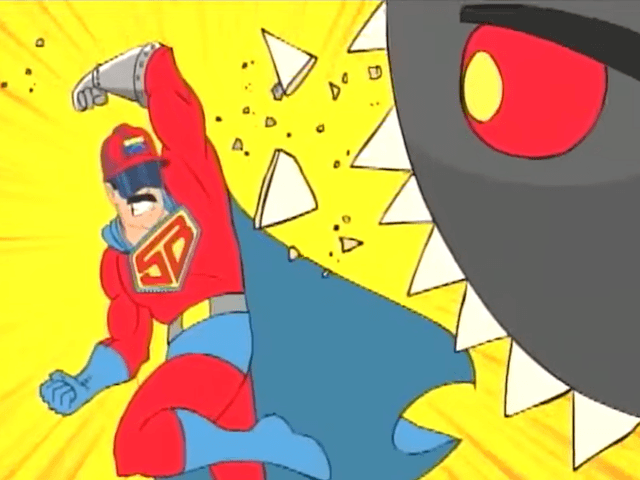CARACAS — For years, the socialist regime of Venezuela has attempted to wage an ideological war against the United States and its “imperialist and capitalist anti-values” that, according to them, are the root of all of Venezuela’s cultural and societal problems.
For the past two decades, superheroes such as Superman, Batman, or Captain America have not been exempt from the Revolution’s criticism — yet, like the U.S. dollar that’s holding the country together, the socialist regime sure loves to embrace these icons of American media … by plagiarizing them.
Venezolana de Televisión, the regime’s main television channel, has begun airing a series of short cartoons titled Súper Bigote (“Super Mustache”). In this, the latest product of the regime’s propaganda machine, socialist dictator Nicolás Maduro is portrayed as a bootleg copy of America’s most iconic superhero: Superman.
Every epic prose needs a hero, and every hero needs a villain — that is where the United States comes into play, as the “U.S. Empire” is the go-to boogeyman for the revolution’s myriad disasters.
Naturally, this idealized heroic version of Maduro, who lacks his real-life obesity, has his enemy in the form of a caricature of former President Donald Trump and his “local lackeys” from the Venezuelan opposition. The socialist regime has espoused villainous narratives attributed to the United States government as excuses for the absolute lack of effort to maintain the country’s infrastructure, such as claiming the electric grid failed because the United States used an electromagnetic pulse (EMP) attack on it or hacked it. The regime has never provided any evidence to support its claims, or detract from the Occam’s razor explanation that it never bothered to invest in keeping the electric grid functional and the people who know how to take care of it are refugees now.
The cartoon features Maduro’s talking points in illustration, such as Maduro wearing a red safety helmet to exemplify his self-appointed title of “worker-president” (he was a bus driver; bus drivers don’t wear helmets) and one of the villains showcasing the letters CJ — which represent the nickname Maduro has given to opposition figurehead Julio Borges: cejota (“big eyebrows”).
Exalting the socialist revolution’s “heroic” leaders is a tried and true tactic that they’ve employed over the course of these past two decades. Case in point, the late Hugo Chavez’s posthumous elevation as the “Supreme and Eternal Commander of the Bolivarian Revolution” in 2013. Many have been the methods of propaganda utilized to perpetuate the idea of Chavez as a superman of his own league, including a weird phase in Venezuela socialist propaganda when he was portrayed as an urban and hip persona.
The embrace of the superhero for the Revolution’s propaganda goes against all they’ve preached against them in years past. Maduro has waged a one-sided war against one of his most bewildering arch-nemeses, Spider-Man, going so far as to blame him for Venezuela’s youth violence. Hugo Chavez also denounced superheroes.
Even though the idea of superheroes and American media as a whole is deemed to be against the socialist values of the Revolution, they can’t seem to get enough.
TVes, another of the regime’s TV channels, born from the seized assets of the former RCTV, openly broadcasts pirated movies without the due licensing from its corresponding copyright holders, including the capitalist superheroes they disdain so much — then again, an authoritarian regime that cares not for human rights would care even less for intellectual property.
According to the former head of Venezuela’s intelligence, Maduro’s defense minister refused to discuss the details of a possible coup against Maduro because he was busy watching Avengers: Endgame.
U.S. media is bad for Venezuelans, that’s what we’ve been told for two decades now — but not for Maduro himself, who has openly boasted of indulging in it through his Netflix account. While Netflix is indeed available in Venezuela, it’s way out of reach for the majority, as, setting aside the glaring internet connectivity issues in Venezuela, Netflix’s subscription costs far exceed the current monthly minimum wage of ten bolivars per month (roughly $2.10).
While certainly ideologically loaded, political satire the likes of Súper Bigote used to be a common exercise of free speech in Venezuela. The socialist regime has made it so that they’re the only ones who can freely satirize others.
Were you to attempt something of this nature within these borders and present Maduro as the villain of a superhero cartoon, you may be facing up to 20 years in prison, courtesy of the socialist regime’s anti-hate speech laws passed in 2017 — which is why I’ve at times have had to tread lightly when satirizing the regime on social media, moreso now that China is advising the socialist regime of Venezuela in matters pertaining to censorship and monitoring of citizens through social media.
Christian K. Caruzo is a Venezuelan writer and documents life under socialism. You can follow him on Twitter here.

COMMENTS
Please let us know if you're having issues with commenting.